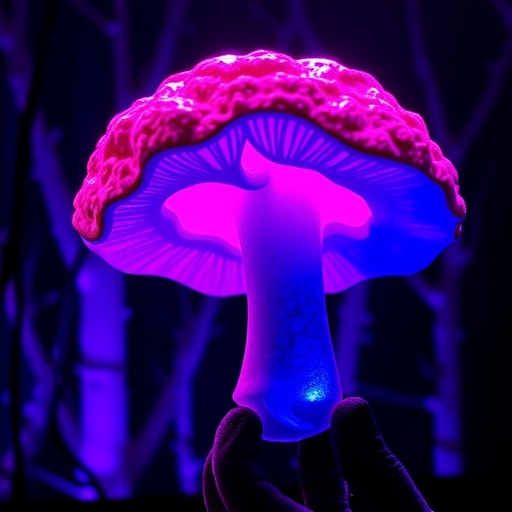In a groundbreaking secondary analysis of a recent randomized clinical trial, researchers have uncovered intriguing insights into how two very different treatments for depression—psilocybin and escitalopram—affect the brain’s processing of negative emotional information. Depression, a leading cause of disability worldwide, is characterized by a pervasive negative affective bias—an enhanced tendency to focus on and remember negative stimuli over positive or neutral ones. This bias is believed to reinforce and perpetuate depressive symptoms, making its modulation a critical target for therapeutic interventions.
Psilocybin, the psychoactive compound found in certain species of psychedelic mushrooms, has garnered considerable attention as an innovative and potentially rapid-acting treatment for depression. Unlike conventional antidepressants like escitalopram, a selective serotonin reuptake inhibitor (SSRI), psilocybin acts primarily on the brain’s serotonin 2A receptors (5-HT2A), which appear to play a key role in mood regulation and cognitive flexibility. This secondary analysis provides the most detailed comparison to date of how these two treatments influence the brain’s affective biases, shedding light on divergent neural pathways that may underlie their therapeutic effects.
The study revealed that both psilocybin and escitalopram led to significant improvements in depressive symptoms, but they differed markedly in their effects on negative affective bias—a critical cognitive mechanism in depression. Participants receiving psilocybin exhibited a more pronounced reduction in the tendency to focus on negative emotional cues, suggesting a robust shift in emotional processing towards a more balanced outlook. Conversely, those treated with escitalopram displayed more subtle changes in affective bias, consistent with the slower onset of clinical improvement observed with SSRIs.
At the neurobiological level, psilocybin’s influence appears to stem from its unique capacity to disrupt entrenched neural circuits implicated in negative thought patterns. Functional imaging data highlighted decreased activity within the default mode network (DMN), a brain network associated with self-referential thinking and rumination, following psilocybin administration. This disruption is theorized to enable cognitive flexibility and the breaking of maladaptive negative biases. Escitalopram, in contrast, primarily modulated regions involved in serotonin neurotransmission without eliciting the same degree of network-wide reorganization.
The temporal dynamics of these effects are especially striking. Psilocybin’s impact on affective bias was observed rapidly after administration, consistent with its potential as a fast-acting antidepressant. Escitalopram required weeks of daily dosing before subtle shifts became evident, underscoring the slower pharmacodynamic profile of SSRIs. This distinction has important clinical implications, particularly for patients with treatment-resistant depression who may benefit from quicker symptom relief.
Another innovative aspect of this research lies in its methodological refinement; by employing a battery of computerized tasks designed to quantify affective bias objectively, the investigators transcended the limitations of traditional clinical rating scales. These tasks assessed participants’ attention to, and memory of, emotionally valenced stimuli, ensuring a rigorous and reproducible evaluation of cognitive-emotional changes induced by the treatments.
The analysis also delved into the potential predictive value of baseline affective bias profiles. Preliminary findings indicate that individuals exhibiting a pronounced negative bias before treatment were more likely to experience substantial improvements with psilocybin, suggesting that cognitive phenotyping could eventually guide personalized treatment strategies. In contrast, escitalopram’s efficacy appeared less tied to initial bias levels, hinting at differing mechanisms of action.
This work importantly navigates the complex interplay between pharmacology, brain network dynamics, and cognition, illuminating pathways through which psychedelic-assisted therapy may recalibrate emotional processing to alleviate depressive symptoms. It opens promising avenues for refining treatment paradigms by integrating neurocognitive markers into clinical decision-making.
Despite the exciting prospect of psilocybin as a novel antidepressant, the researchers emphasize that both treatments remain valuable tools in the psychiatric arsenal. SSRIs like escitalopram continue to be frontline agents with well-characterized safety profiles, whereas psilocybin, although promising, requires further investigation to understand long-term outcomes and optimal dosing protocols.
Concerns about the generalizability of the findings are addressed through the study’s rigorous randomized controlled design and the replication of results across diverse demographic groups. However, the authors call for larger-scale studies to validate and extend these insights, particularly exploring how combinations of psychotherapy and pharmacotherapy might synergistically target affective bias.
From a neuropsychological standpoint, the work contributes to a more nuanced conceptual framework wherein depression is not solely defined by mood symptoms but also by cognitive biases that skew emotional experience. Therapeutic success may thus best be measured in terms of restored balance and flexibility in affective processing, rather than remission of isolated symptoms.
The study’s implications extend beyond depression, as negative affective biases are core features of other psychiatric disorders such as anxiety and post-traumatic stress disorder. Insights gleaned here may therefore catalyze broader innovations in the treatment of mood and anxiety disorders.
In sum, by contrasting the neural and cognitive impacts of psilocybin and escitalopram, this landmark research elevates our understanding of how distinct pharmacological agents can manipulate affective bias to achieve antidepressant effects. This resonates profoundly in the ongoing quest to develop more effective, faster-acting, and personalized therapies for depression.
As the field progresses, integration of neuroimaging, behavioral phenotyping, and clinical outcomes will be crucial to harness the full potential of psychedelic compounds while maintaining rigorous safety standards. This study marks a vital step toward that future, offering a compelling narrative of how ancient psychedelics and modern pharmaceuticals both converge on reshaping the emotional brain.
Given the staggering global burden of depression, innovations in understanding and modifying negative affective bias promise transformative impacts on mental health worldwide. This analysis catalyzes hope for patients caught in the grip of depression, demonstrating that targeting core cognitive biases pharmacologically can pave the way for profound and enduring recovery.
Subject of Research: The investigation focuses on understanding how treatments with psilocybin and escitalopram modulate negative affective bias in individuals with depression.
Article Title: Negative affective bias in depression following treatment with psilocybin or escitalopram – a secondary analysis from a randomized trial.
Article References:
Martens, M.A.G., Cunha, B.G., Erritzoe, D. et al. Negative affective bias in depression following treatment with psilocybin or escitalopram – a secondary analysis from a randomized trial. Transl Psychiatry (2025). https://doi.org/10.1038/s41398-025-03693-w
Image Credits: AI Generated




